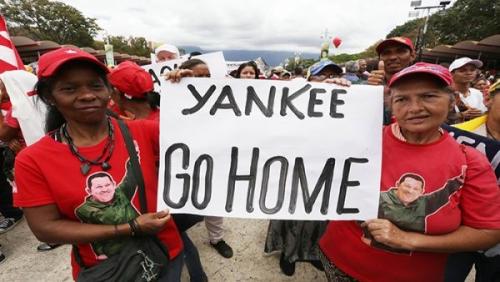The United States prepares a new offensive against Venezuela
The US political-military manuals consider that the strongest weapon for bringing a people to their knees is to defeat them through shortages.
- Análisis

President Nicolás Maduro took possession of the Venezuelan Executive for the second time in the midst of a crisis created by an offensive of the United States government against the Bolivarian Republic. For 20 years, since Comandante Hugo Chávez won the elections, Washington has not rested in its attempts to put an end to the radical reforms introduced by a government which proclaims itself “socialist of the XXI century”. The two big political parties of the United States – Republican and Democratic – concur that the Bolivarian governments do not respond to their interests. In the first place, they did not like the rhetoric of the late Chávez nor do they like the figure (and his working class origin) of Maduro. More importantly, they reject the Bolivarian policy of putting the enormous wealth of Venezuela at the service of the population.
To combat this initiative Washington – under Democratic and Republican governments – has applied all kinds of economic sanctions in order to create chaos in the internal market of Bolivar’s homeland. At the same time, they have created a deadly alliance with 12 Latin American governments in the “Lima group” and have recruited the European Community. This list does not include the attempted assaults against the principal leaders of the Bolivarian governments, nor the military threats of the Pentagon, nor the freezing of Venezuelan properties in the United States.
At the popular level, in the United States propaganda (or “fake news”) has created misunderstandings on the part of broad sectors of US public opinion who believe that there is a “dictatorship” in Venezuela (in spite of having carried out 25 elections over the past 20 years). But a significant portion of the population is familiar with the diatribe of the media when they attack reformist or progressive Latin American governments. To the accusations that they are drug traffickers, that they assassinate their populations, oblige the people to suffer hunger, they have added a new one: now they are accused of “humanitarian” crimes. This last piece was attributed to Hilary Clinton when she was President Obama’s Secretary of State.
According to a Washington think tank, “we can expect an international scenario with more diplomatic pressure, with heavier sanctions and more coordination between Latin American countries and the European Union. Up to now the pressure and sanctions have not had a great impact, so we cannot exclude the possibility that (Maduro) will continue. Many people have underestimated his capacity to resist, but he still has resources to do so”. They add that Maduro “has almost no opposition because they are afraid, exhausted or have left the country. And the military leaders still appear to be loyal, hence his internal position appears to be secure” [quote retranslated from the Spanish].
Michael Shifter, of Inter-American Dialogue, does not mention the most important resource that the Bolivarian government has, which is the Venezuelan people. The US political-military manuals consider that the strongest weapon for bringing a people to their knees is to defeat them through shortages: cutting off access to basic consumer goods, hitting their self-esteem and demobilizing them. Shifter believes that “first (the United States) will attempt to form alliances with nearby governments, among them Colombia and Brazil, to intensify the sanctions. They have already experimented with various sanctions on the financial system and there could be more. They are considering all options, among these, cutting off the purchase of petroleum, although there is still a debate on the implications of this.” He does not mention military intervention although, according to President Trump, it is an option not to be discarded. Simply mentioning Colombia and Brazil, countries that share extensive borders with Venezuela, is an indication that the military option is open.
Shifter recognizes that the Maduro government has the necessary force to confront an offensive by the United States. He proposes a negotiated outcome between Washington and Caracas. He points out that the opposition has no capacity. “They’ll have to find a way to create an opposition that is more coherent and with legitimate leaders.” But can you manufacture a political leadership when there is no social base?
Shifter also refers to a Latin American “left” that appears to be retreating before right wing governments such as that presided over by Jair Bolsonaro in Brazil. “Those who think that (the left) is finished in Latin America and that it will not re-appear are wrong. If the rightist governments do not succeed, the left will be there to replace them. If Bolsonaro or Duque are a disaster, who do you think will occupy this space?”
17/01/2019
(Translated for ALAI by Jordan Bishop)
- Marco A. Gandásegui, Jr., is professor of sociology at the Universidad de Panamá and associate researcher with the Centro de Estudios Latinoamericanos Justo Arosemena (CELA)
http://marcogandasegui2017.blogspot.com/
Del mismo autor
- La pandemia no es el fin del capitalismo 23/04/2020
- Hay que masificar las pruebas contra un virus clasista 19/04/2020
- ¡Qué falta hacen los Comités de Salud de J. Renán Esquivel! 09/04/2020
- La desigualdad social y la desconfianza contribuyen a la epidemia 02/04/2020
- Hacen falta más ‘pruebas’ para ‘suprimir’ el coronavirus 26/03/2020
- La crisis del capitalismo y el coronavirus 19/03/2020
- Urge una movilización general para atacar el corona-virus 12/03/2020
- Se necesita liderazgo y transparencia para enfrentar el corona-virus 05/03/2020
- EEUU veta relaciones entre Panamá y China 27/02/2020
- Roberto Arosemena, sus ideas perduran y sus luchas continúan 20/02/2020
Clasificado en
Clasificado en:
Desestabilización
- Rosa Miriam Elizalde 15/11/2021
- Francisco Domínguez 11/08/2021
- Clara Sánchez 04/08/2021
- José Manuel Zelaya rosales 30/07/2021
- Francisco Domínguez 21/07/2021








